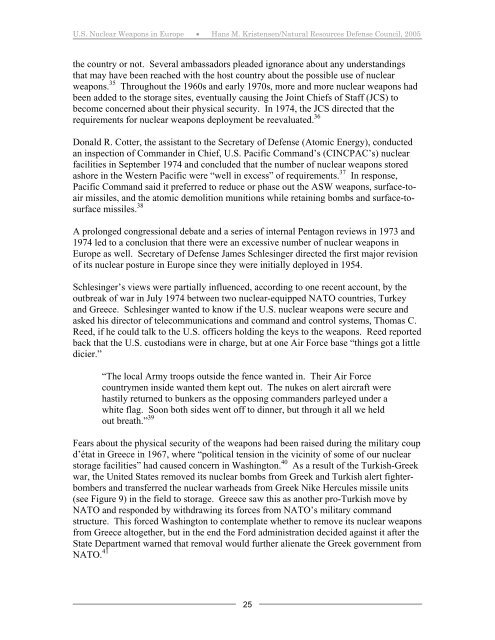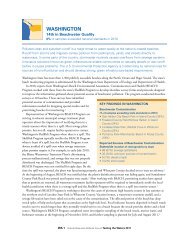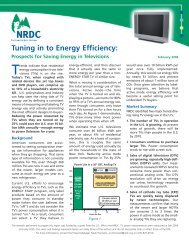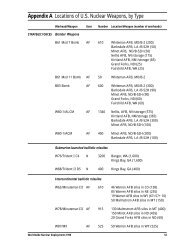US Nuclear Weapons in Europe - Natural Resources Defense Council
US Nuclear Weapons in Europe - Natural Resources Defense Council
US Nuclear Weapons in Europe - Natural Resources Defense Council
You also want an ePaper? Increase the reach of your titles
YUMPU automatically turns print PDFs into web optimized ePapers that Google loves.
U.S. <strong>Nuclear</strong> <strong>Weapons</strong> <strong>in</strong> <strong>Europe</strong> • Hans M. Kristensen/<strong>Natural</strong> <strong>Resources</strong> <strong>Defense</strong> <strong>Council</strong>, 2005<br />
the country or not. Several ambassadors pleaded ignorance about any understand<strong>in</strong>gs<br />
that may have been reached with the host country about the possible use of nuclear<br />
weapons. 35 Throughout the 1960s and early 1970s, more and more nuclear weapons had<br />
been added to the storage sites, eventually caus<strong>in</strong>g the Jo<strong>in</strong>t Chiefs of Staff (JCS) to<br />
become concerned about their physical security. In 1974, the JCS directed that the<br />
requirements for nuclear weapons deployment be reevaluated. 36<br />
Donald R. Cotter, the assistant to the Secretary of <strong>Defense</strong> (Atomic Energy), conducted<br />
an <strong>in</strong>spection of Commander <strong>in</strong> Chief, U.S. Pacific Command’s (CINCPAC’s) nuclear<br />
facilities <strong>in</strong> September 1974 and concluded that the number of nuclear weapons stored<br />
ashore <strong>in</strong> the Western Pacific were “well <strong>in</strong> excess” of requirements. 37 In response,<br />
Pacific Command said it preferred to reduce or phase out the ASW weapons, surface-toair<br />
missiles, and the atomic demolition munitions while reta<strong>in</strong><strong>in</strong>g bombs and surface-tosurface<br />
missiles. 38<br />
A prolonged congressional debate and a series of <strong>in</strong>ternal Pentagon reviews <strong>in</strong> 1973 and<br />
1974 led to a conclusion that there were an excessive number of nuclear weapons <strong>in</strong><br />
<strong>Europe</strong> as well. Secretary of <strong>Defense</strong> James Schles<strong>in</strong>ger directed the first major revision<br />
of its nuclear posture <strong>in</strong> <strong>Europe</strong> s<strong>in</strong>ce they were <strong>in</strong>itially deployed <strong>in</strong> 1954.<br />
Schles<strong>in</strong>ger’s views were partially <strong>in</strong>fluenced, accord<strong>in</strong>g to one recent account, by the<br />
outbreak of war <strong>in</strong> July 1974 between two nuclear-equipped NATO countries, Turkey<br />
and Greece. Schles<strong>in</strong>ger wanted to know if the U.S. nuclear weapons were secure and<br />
asked his director of telecommunications and command and control systems, Thomas C.<br />
Reed, if he could talk to the U.S. officers hold<strong>in</strong>g the keys to the weapons. Reed reported<br />
back that the U.S. custodians were <strong>in</strong> charge, but at one Air Force base “th<strong>in</strong>gs got a little<br />
dicier.”<br />
“The local Army troops outside the fence wanted <strong>in</strong>. Their Air Force<br />
countrymen <strong>in</strong>side wanted them kept out. The nukes on alert aircraft were<br />
hastily returned to bunkers as the oppos<strong>in</strong>g commanders parleyed under a<br />
white flag. Soon both sides went off to d<strong>in</strong>ner, but through it all we held<br />
out breath.” 39<br />
Fears about the physical security of the weapons had been raised dur<strong>in</strong>g the military coup<br />
d’état <strong>in</strong> Greece <strong>in</strong> 1967, where “political tension <strong>in</strong> the vic<strong>in</strong>ity of some of our nuclear<br />
storage facilities” had caused concern <strong>in</strong> Wash<strong>in</strong>gton. 40 As a result of the Turkish-Greek<br />
war, the United States removed its nuclear bombs from Greek and Turkish alert fighterbombers<br />
and transferred the nuclear warheads from Greek Nike Hercules missile units<br />
(see Figure 9) <strong>in</strong> the field to storage. Greece saw this as another pro-Turkish move by<br />
NATO and responded by withdraw<strong>in</strong>g its forces from NATO’s military command<br />
structure. This forced Wash<strong>in</strong>gton to contemplate whether to remove its nuclear weapons<br />
from Greece altogether, but <strong>in</strong> the end the Ford adm<strong>in</strong>istration decided aga<strong>in</strong>st it after the<br />
State Department warned that removal would further alienate the Greek government from<br />
NATO. 41<br />
25
















